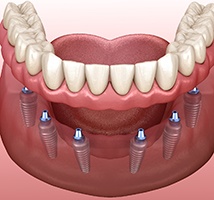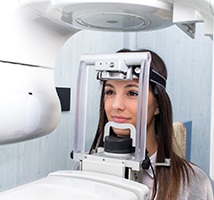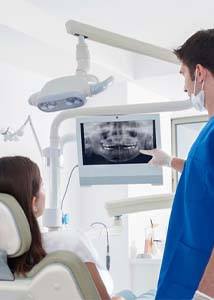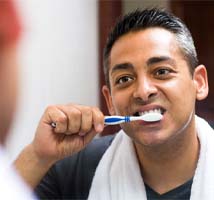
Dental Implants — Jonesboro, AR
Complete Your Smile with Dental Implants in Jonesboro

Dental implants in Jonesboro have transformed the way we replace missing teeth. In the past, only the visible portions of a tooth were restored, but now the root is as well with the use of an implant post. This not only provides exceptional stability and support for your replacement tooth, but it also stimulates new bone growth to protect your jaw from deterioration. This improves your oral health while providing you with a solution that has the potential to last for a lifetime. Now, you can enjoy both the placement of the posts and the restoration process from one caring dental team. From start to finish, we will be by your side to complete your smile, so give Woodsprings Family Dentistry a call to get started!
Why Choose Woodsprings Family Dentistry for Dental Implants?
- Places and Restores Dental Implants Entirely In-House
- Calming Sedation Options Available for Nervous Patients
- Modern Dental Technology Ensures Best Treatment Outcomes
What Are Dental Implants?

Many people, both patients and dentists alike, prefer a dental implant as an alternative to a fixed bridge. An implant post is surgically placed into your jawbone to replace the tooth’s root. An abutment is connected to the post to attach a custom-made restoration, which could be either a crown, bridge, or denture. With the right aftercare, your new smile can last for several decades. Furthermore, eating your favorite food feels natural as your prosthetic root gives new life to your existing jawbone tissue. If you want the best long-term solution for missing teeth, regardless of how many you need replaced, dental implants are right for you!
The Dental Implant Process

When people learn about dental implants for the first time, they often have many questions. Learning that most tooth replacement options don’t replace the entire tooth is news to them, but they also ask why that matters in the first place. For one, dental implants help you restore not just your tooth, but your tooth’s functions to the absolute fullest. To best understand it, we recommend reading through the process that Dr. Sarah Yarnell goes through every time a patient chooses dental implants to replace teeth. If you have additional questions, feel free to contact our office directly!
Initial Consultation

To start, our office will listen to your concerns and determine which type of dental implant treatment is right for you. Dental implants can be used to replace single, multiple, or all the teeth in your arch with ease, but we’ll need to confirm which option is most ideal during your consultation. Then, we’ll determine the current status of your oral health. If you have gum disease or extensive tooth decay, we’ll need to treat these conditions before moving forward. Finally, we’ll perform multiple X-rays so we can assess your current bone volume. If not enough bone is available for dental implants, a bone graft will be needed to expand the amount of bone available for integration.
Dental Implant Surgery

Our office performs the surgical portion of your treatment in-house for your convenience. Even though getting dental implants is a relatively involved procedure, most patients report that it is not painful. Thanks to advancements in local anesthetics and sedation dentistry, the nerves around the dental implant site will be completely numbed so you shouldn’t feel anything but some pressure during your treatment. In some cases, your Jonesboro implant dentist may recommend sedation dentistry to make you feel as comfortable and relaxed as possible all throughout your appointment.
To start, we’ll create a small incision inside of your gum tissue to expose the alveolar (jaw) bone, then place the titanium post inside of your jaw before closing the gum tissue. This will allow the implant to effectively integrate with your jaw, creating the long-lasting bond that’s so associated with dental implant treatment.
Osseointegration & Abutment Placement

It takes a few months for titanium to effectively integrate with bone tissue. During this period, you’ll wear a temporary restoration that covers the tooth so that it can be properly shielded throughout the day. Once the bone tissue has fully healed, we’ll be able to cover it with an abutment, which is a connector that stabilizes the overall restoration. After the abutment is placed, we’ll allocate a few more weeks for the gum tissue to heal around the implant. The length of this phase can vary depending on the complexity of your tooth replacement treatment.
Delivery of Final Restoration

Finally, after your dental implant(s) have fully healed and integrated, we can place the permanent restoration on top. This restoration could be a single implant crown, dental bridge, or full/partial denture, depending on what your needs were as discussed during the initial consultation. All of our restorations are made with natural-looking materials, including porcelain and acrylic, to ensure the most lifelike tooth replacement possible. Prior to their creation, we will have captured an impression of your implant after the abutment was placed to ensure the most secure fit possible. Once placed, we’ll go over the most important steps to maintain your new smile.
Benefits of Dental Implants

Dental implants offer over a 95% success rate because they are the only tooth replacement option to mimic both the root and crown. This allows them to provide certain benefits that are not possible with other solutions, like dentures. In your pursuit to replace your missing teeth, you may not fully realize the unique advantages that come with permanent prosthetics. Instead of relying on a solution that offers minimal stability and a shortened lifespan, you can enjoy life to its fullest when you consider the benefits of dental implants in Jonesboro. Below are just a few of the many unique advantages you can expect:
Day-to-Day Benefits

- If you want a prosthetic that is easy to clean and maintain, dental implants are right for you. Dentures require soaking and additional products to keep them clean, whereas, dental implants work just like regular teeth, making it possible for you to take better care of your new teeth and enjoy greater oral health in return.
- Your favorite foods are once again a possibility with dental implants in Jonesboro. Unlike dentures that can experience some difficulties when trying to chew through certain foods, dental implants allow for a stronger bite force and chewing power. Not to mention, you’ll never need to worry about your prosthetics slipping or falling out!
- No one wants to feel self-conscious about their smile, which is why dental implants can provide boosted confidence like never before. A large percentage of denture-wearers admit they forgo social gatherings out of embarrassment. They also admit problems with their love life because of their prosthetics. With dental implants, you can freely and confidently live life to its fullest and enjoy spending time with family and friends.
Health Benefits

- By choosing to replace your missing teeth with dental implants, you do not need to worry about dental drift. Your natural, healthy teeth will remain firmly in place, preventing the possibility of needing orthodontic treatment in the future.
- Your regular, healthy teeth do not need to be altered when receiving dental implants. Unlike a fixed bridge that uses adjacent teeth as anchors, permanent prosthetics do not need to touch your existing tooth structures.
- You can minimize your risk for systemic issues when choosing dental implants. Dentures only sit on top of the gum and offer no stimulation to your jawbone. Should you develop gum disease, it can break down your jawbone even further and put you at risk for heart disease, osteoporosis, diabetes, and more. Dental implants will mimic the natural tooth root and continue to stimulate your jawbone, effectively improving your oral health and potentially extending your lifespan.
Long-Term Benefits

- After 10 years, you can expect the success rate of your dental implants to be around 90-95%. This is one of the great benefits of seeing a trusted implant dentist in Jonesboro.
- As long as you remain committed to a proper oral hygiene routine, you can expect your new smile to last 30 years or even a lifetime!
- While it’s true that dental implants are more expensive up front, they are more cost-effective in the long run. There’s no need to buy adhesives, special cleaning supplies, and you won’t require frequent adjustments or replacements every 5-7 years like you would if you had dentures or a fixed bridge.
Who Dental Implants Can Help

As long as you have a healthy mouth and jawbone, you can consider dental implants as a way to fill in the gaps in your smile no matter how many teeth are missing. Of course, we’ll need to confirm that you are a candidate for dental implants first, and we’ll plan the procedure based on your unique needs. Both of these things can be taken care of during your initial implant consultation. Before you call your dental implant dentist in Jonesboro, read on to learn more about the different situations where dental implants can be used.
Who is a Good Candidate for Dental Implants?

Most healthy adults are viable candidates for dental implants, which is why the procedure has been gaining in popularity in recent years. There are three key traits you should have before dental implant placement is performed:
- Good Health Overall: Dental implant placement is a minor surgery. Your body will therefore need to be in good enough shape in order to successfully recover from such a procedure.
- Healthy Teeth and Gums: Your mouth needs to be free of gum disease and cavities. Such conditions could increase the chances of implant failure.
- Sufficient Bone Density: The jawbone needs to be strong enough to support dental implants. Bone grafts may be required if bone loss has already occurred.
Missing 1 Tooth

By itself, a dental implant can serve as a base for a dental crown. This is longer-lasting option to a traditional dental bridge, and it does not require us to remove enamel from your remaining healthy teeth. Because the implant post will be inserted directly into the jawbone, the crown mimics the way the natural teeth emerge from the gums. The final restoration will be personalized to match the size, shape, and color of your natural teeth; you may even occasionally forget which tooth is a prosthetic!
Missing Multiple Teeth

The solution for multiple missing teeth depends on how many teeth were lost and where they were all located. If you lost three or more teeth all in a row, then you may be a candidate for an implant bridge. The restoration will be anchored to two implant posts instead of natural teeth, making it a good option for filling in large gaps. On the other hand, when there’s empty space throughout an arch, a partial denture is typically a better option. A select number of implants will be placed depending on the number of teeth that the partial denture replaces.
Missing All Teeth

A custom-made denture can be secured to 4 to 6 dental implant posts. You can say good-bye to awkward situations where your teeth slip or come loose at the wrong time. Implant dentures can be removable, but oftentimes they’re fixed in place, meaning that you can brush and floss them in much the same way that you would take care of your natural teeth.
Understanding the Cost of Dental Implants

There is no set price for dental implant treatment because the amount you will pay is determined by your individual treatment plan, which accounts for your unique needs and preferences. There are several factors that will influence the cost, such as how many dental implants you need, what type of restoration you’re interested in, and if you need any preliminary treatments beforehand.
To help you understand how much you can expect to pay, we will provide you with an estimate and your payment options during your consultation. We’ll also be happy to review various financing options as well. While dental implants are initially more expensive than other tooth replacement options, they’re an investment that can easily pay for themselves over time. Read on to learn more important information about the cost of dental implants in Jonesboro.
Preliminary Treatments & Dental Implant Surgery

Before we begin replacing your missing tooth or teeth with dental implants, you may need to undergo a preliminary treatment. This could include bone grafting or gum disease therapy, depending on what is standing between you and your candidacy for dental implants. While these preparatory services will add to the overall cost of your dental implants, they’re necessary for maximizing your chances of long-term success for your dental implants.
Your dental implant placement surgery will also incur a cost of its own. This price can vary depending on where in the mouth your implants are being placed and what type of dental sedation is used. We’re proud to offer dental implant placement surgery right here in our Jonesboro office, saving our patients the time, money, and inconvenience of visiting an unfamiliar specialist.
The Parts of Your Dental Implant

Next, we’ll need to consider the dental implant itself, which includes factors like:
- Number of dental implants: Typically, the more implants you need, the higher the cost. Remember, you won’t always need an implant for every missing tooth!
- Type of restoration: Your dental implants can support restorations like crowns, bridges, and dentures, which each come at their own price point.
- Size or material: If an implant is a different size than average or made of zirconia instead of titanium, it will be reflected in the final cost.
- Brand of dental implant: We only use trusted, high-quality brands of dental implants at our office. While some companies offer cheaper dental implants, these brands often do not provide the best results. To learn more about the brand of your dental implant, feel free to ask!
Dental Implants Pay for Themselves

Many patients are hesitant to choose dental implants over dentures or a dental bridge because of the initial price difference. However, it’s important to consider that dental implants are an investment that can pay for itself over time, while dentures and dental bridges will slowly cost you more money and discomfort as the years go by.
For example, dentures and dental bridges become loose and ill-fitting, and will need to be replaced every 5-7 years. Dental implants on the other hand have the potential to last a lifetime, which can save you thousands of dollars in replacements alone! Plus, you won’t need to buy any extra cleaning products or adhesives and you will likely spend less on your oral healthcare costs.
Does My Dental Insurance Cover Dental Implants?

Dental implants are not usually covered by insurance entirely. Instead, you can generally expect parts or portions of your dental implant treatment to be covered. For example, your insurance may pay for 50% of your restoration, or it may cover some of the expenses tied to any necessary preliminary procedures you need. It all depends on the details of your specific plan. Our knowledgeable team will be happy to review your insurance coverage with you to ensure your benefits are being maximized and your out-of-pocket expenses are being minimized. Additionally, we are often able to help patients find no- to low-interest payment plans that fit into their budget to make dental implants affordable.
Dental Implant Technology

As an office you can trust to perform every stage of your dental implant treatment all in one location, we want to be as thorough as possible when it comes ensuring the long-term success of your tooth replacement. While Dr. Yarnell has completed many years of education in dental implants and performed the treatment countless times, she never wants to stop making your care as modern and precise as she can. That’s why she uses advanced dental implant technology as well. We encourage you to learn more about the instruments we utilize ahead of your next appointment!
3D Cone Beam Imaging

When a digital X-ray cannot provide us with the information we need to confidently plan treatment and place your dental implants, we turn to our CT cone beam scanner. Since digital X-rays can be far more limited in their scope, this scanner is more effective at capturing the many structures inside your mouth. This includes the upper and lower jaw; the one we focus the most on will depend on where your implant post will be placed.
The way the device works is relatively simple. We start by asking you to place your head in the middle of the scanner, resting it on the chin rest. Then, the scanner rotates around your head in a 360 degree motion to capture a 3D image over the next few minutes. From there, we can examine your detailed oral structures more closely and begin planning your surgery.
Keep in mind we are not only evaluating your available bone tissue. We are also taking note of the location of other sensitive areas, such as nerve endings and blood vessels. These are structures we want to do everything possible to avoid, making your surgery more predictable.
Dental Implant Post-Op Instructions

After your dental implant has been placed, you’ll need some time to rest and recover. How long the healing process will take for you will depend on your health, how many implants you had placed, and several other factors. Typically, you’ll need to rest for a few days. For the first two days, it’s normal to experience some bleeding, bruising, swelling, and discomfort. We’ll give you specific instructions and a prescription for pain medication to help you manage these symptoms. Over-the-counter pain relivers, ice packs, rest, proper oral hygiene, and soft foods will all help your recovery go smoothly. After about a week, your mouth should begin to feel normal again. Read on to learn more important dental implant post-op instructions in Jonesboro.
What to Do Directly After Dental Implant Surgery

Rest and special care of the implant site are essential as you recover from dental implant surgery. You’ll need to keep the blood clot in place and protect site from infection. Thankfully, you can help the recovery process go quickly and smoothly by:
- Taking prescribed or over-the-counter pain medication as we instruct
- Resting and avoiding strenuous activity for several days
- Swallowing, not spitting, your saliva and avoiding straws for at least a week
- Keeping your fingers and tongue away from the implant site
- Practicing excellent dental habits carefully
- Quitting tobacco products
Common Side Effects After Dental Implant Surgery

If you’ve never had oral surgery before, it can be worrisome not knowing what side effects to expect. It’s important to be aware of what symptoms are a normal part of the healing process and which should be brought to your dentist’s attention right away.
In the next 24-48 hours after your dental implant surgery, you will typically experience some slight discomfort, swelling, and bruising in your mouth. These should all be easy to manage with pain medication and an icepack. Intermittent, light bleeding is also common and may last several days.
However, if your symptoms do not seem to be improving after 48 hours, or if it feels like they’re getting worse, you should call us immediately. We’ll see what we can do to relieve your symptoms and we’ll ensure there are no underlying issues.
Your Diet After Dental Implant Surgery

Stock up on soft, nutritious foods to enjoy after your dental implant surgery, such as:
- Applesauce
- Cottage cheese
- Yogurt
- Pudding
- Eggs
- Pasta
- Mashed potatoes
- Frozen yogurt or ice cream
As you begin to feel better, you can gradually reintroduce more foods into your diet as you feel comfortable to do so.
Health & Oral Hygiene After Dental Implant Surgery

Keeping your mouth clean and free of bacteria is key for preventing an infection in the surgical site and moving your healing period along quickly. This means you should continue to brush for two minutes twice a day with a soft-bristled toothbrush and fluoridated toothpaste and floss all of your teeth at least once a day. While doing so, you can clean the surgical site, but be very gentle to avoid irritating the tissue or dislodging the blood clot. You should also avoid spitting out mouthwashes forcefully and should stay away from mouthwashes that contain alcohol, which can cause dry mouth.
What to Do After Your New Teeth Are Attached

Once the healing period after your dental implant surgery is over and your implant has fully fused with your jawbone, you should be all set to receive your beautiful new custom-made restoration! Once it has been placed, you may feel some mild sensitivity in you gum tissue, but it should be fleeting and easily managed with over-the-counter pain relivers. Should swelling or bleeding develop after the restoration has been placed, please call us right away so we can ensure your smile is healthy!
Maintaining & Caring for Your Dental Implants

One of the reasons countless patients choose to invest in dental implants is their longevity. They have the ability to last for decades, maybe even a lifetime – but only if they’re properly maintained. Luckily, caring for your dental implants in Jonesboro is fairly simple. In fact, it’s quite similar to taking care of your natural pearly whites. Here are some basic tips for making your dental implants last as long as possible!
Prioritize Oral Hygiene

Infection in the supportive gum tissue is the most common reason why dental implants fail. To prevent this, you must be diligent about your oral hygiene. Brush your implant restorations as well as your natural teeth twice a day, taking care to brush along the gumline. Floss around your restoration at least once daily. (This process may be a bit different from flossing normally, so don’t be afraid to ask us for advice!) Lastly, rinsing with an antimicrobial mouthwash every day can kill bacteria and other harmful germs in areas of your mouth that your toothbrush and floss can’t quite reach.
Watch What You Eat

Dental implants make chewing much easier than it would be with dentures. This solution restores the roots of your teeth, allowing you to chow down on practically any food. However, try not to overindulge in sugary or starchy items, as they can feed dangerous oral bacteria that may contribute to implant failure. Instead, fill your diet with fresh fruits, vegetables, daily products, and lean proteins to keep your new smile strong and healthy.
Break Harmful Habits

Avoid using your implants (or remaining teeth) for anything other than chewing, such as holding extra bags of groceries, biting your fingernails, and opening bottles or packaging. One little slip could easily break a restoration or even damage the implant post itself.
Additionally, we cannot recommend enough that you quit smoking before getting dental implants. In addition to the litany of overall health problems that tobacco can cause, it slows your rate of healing and increases the risk of oral infections. In fact, people who smoke are up to 20% more likely to experience dental implant failure compared to nonsmokers.
Don’t be afraid to ask our team for advice on quitting these habits. We won’t judge – we’re here to help!
Protect Your Dental Implants by Wearing a Mouthguard

If you play sports, or even engage in certain physical activities by yourself (like cycling or jogging), your teeth and implants are at risk of injury. To protect them, always wear a mouthguard during these activities. You could purchase a cheap mouthguard from the sporting goods store, but you’re much better off investing in a custom-made tray from our office. It will provide a superior fit, resulting in better protection.
A condition known as bruxism, in which you involuntarily grind your teeth, can also put your implants at risk. This habit, which often occurs while sleeping, places stress on your implants and teeth that can lead to wear and tear and even fracturing. We may prescribe a custom nightguard to protect your teeth at night. Just like with mouthguards, custom-made appliances from our office will work much more effectively than store-bought alternatives.
Schedule Regular Dental Checkups

We recommend that patients with dental implants visit us at regular intervals -usually at least once every six months – to make sure your implants and remaining teeth are still in good condition. If there is a problem, Dr. Yarnell can detect it early enough at these appointments so that treatment is usually simple and cost-effective. These checkups also give you an opportunity to ask our team any further questions you may have about dental implant maintenance.
Dental Implants FAQs

If you’re considering replacing missing pearly whites, then dental implants provide the most effective solution. With their support, they can prevent further tooth loss as well as preserve a more youthful facial structure. While you can expect to enjoy numerous benefits with these restorations, you’ll likely want to know as much as you can before committing to the treatment. To help make this process easier for you, our team at Woodsprings Family Dentistry has collected and answered several of the most common questions we get about dental implants in Jonesboro. Read on or give us a call today to learn more!
Do Dental Implants Feel Natural?
Unlike other tooth-replacement options which rely on your gums or remaining teeth to stay firmly in place, dental implants will be directly anchored into your jawbone. Since they’ll serve as your new permanent roots, you won’t have to worry about any sensitivity, gum irritation, jaw pain, or your restorations shifting out of position. Once the osseointegration process completes successfully, your dental implants will look and feel just like your natural pearly whites.
Does It Hurt to Get Dental Implants?
While having oral surgery may seem overwhelming at first, you won’t have anything to worry about. Our team will ensure that you’re comfortable before your procedure by numbing the area of your mouth that we’ll be working on. This will allow you to undergo the treatment without any uncomfortable sensations. We may even be able to offer sedation therapy to help you stay relaxed if you’re feeling nervous or anxious about your appointment. Once your procedure is finished and the local anesthetic has worn off, you may feel mild soreness in your surgical site. You can manage this easily by taking over-the-counter pain relievers or applying a cold compress to the outside of your mouth to reduce any swelling.
Am I Too Old or Young to Get Dental Implants?
If you’re struggling with tooth loss, then you’ll likely benefit from dental implants. Our team generally recommends that patients who are younger and don’t have fully developed jaws may need to hold off on getting these restorations. The age limit can vary, as teeth mature around 18 years old for boys and 16 years old for girls. However, as long as your gums and jawbone are strong and healthy, you can get dental implants even if you’re 90 years old! Be sure to schedule a consultation with Dr. Yarnell so she can determine if your oral health is in good condition to start the procedure.
Can I Get Dental Implants If I Smoke?
Using tobacco products not only increases your chances of oral cancer but can also raise the risk of dental implant failure. This is because smoking or chewing these substances can interfere with your body’s natural recovery process. Since osseointegration is essential for your dental implants to bond successfully with your jawbone, you’ll want to avoid using these products altogether. Doing so can also help prevent making your mouth more susceptible to infection, which can weaken the connective tissue holding your restorations and any remaining teeth in place. Be sure to at least refrain from using tobacco products for two weeks before and a month after your surgery.
How Long Do Dental Implants Last?
The lifespan of dental implants typically depends on the health and lifestyle choices of the patient. To ensure that they last, it’s important that you brush twice, floss, and rinse with mouthwash daily. Avoid chewing on anything particularly hard or sticky, and always attend your regular cleanings and checkups. With proper maintenance, implants can last upwards of three decades! This is several times longer than traditional bridges or dentures.
Will I Have to Take Off Work for Dental Implant Surgery?
Most patients only need to take one or two days off work to get dental implants. If your job is physically demanding, you may want to take at least three to four days off, as heavy exercise can divert blood from the implant site and delay healing. However, every case is different. During your consultation, we can give you a more specific recommendation based on your unique case.
Can I Get Dental Implants If I’m Diabetic?
If your diabetes is under control, your odds of dental implant success are generally comparable to those of nondiabetic patients. Uncontrolled diabetes can slow down the healing process, making it harder for your implants to integrate with your jawbone. If you’re interested in getting dental implants, talk to your endocrinologist or primary care doctor about getting your blood sugar levels under control ahead of time.
Do I Need a Bone Graft Before Getting Dental Implants?
When you’re missing teeth, the jawbone often atrophies, as the roots of the teeth are no longer stimulating it through regular biting and chewing. Bone grafting involves transplanting a piece of bone tissue to the jawbone to strengthen it so it can accommodate dental implants. Dr. Yarnell will take detailed scans of your jaw area to determine whether you’ll need bone grafting before getting dental implants.